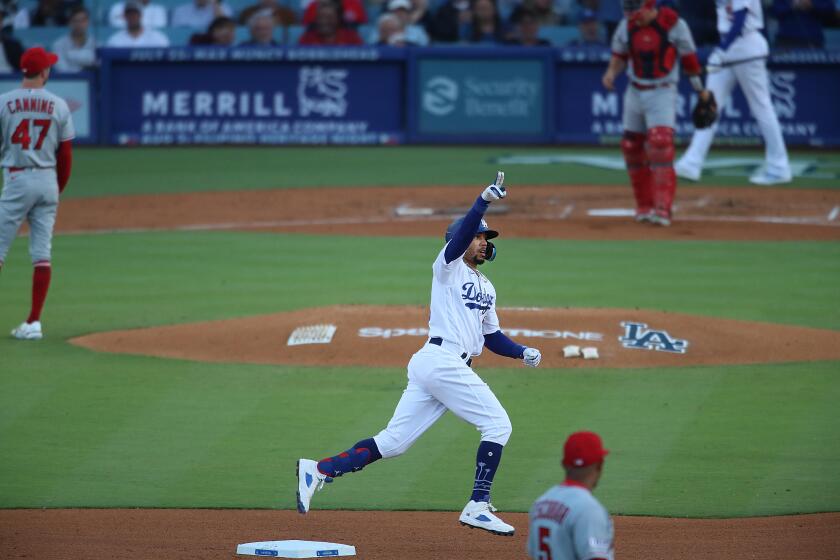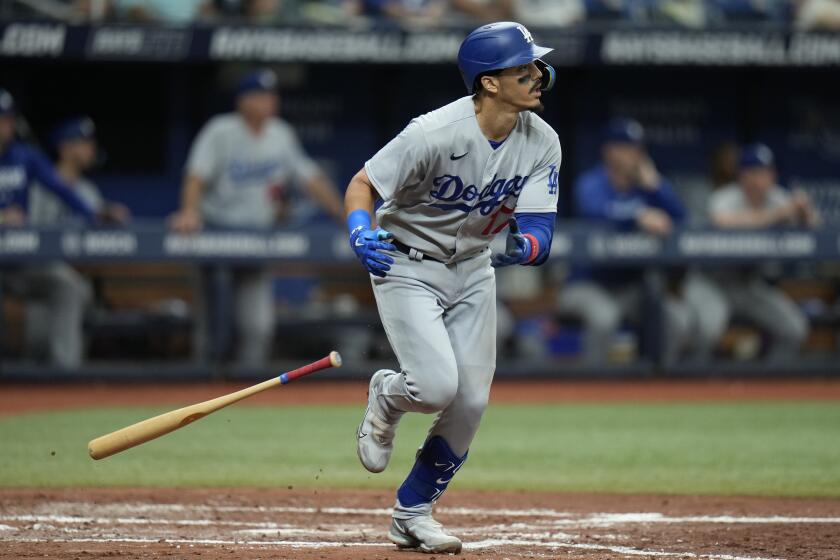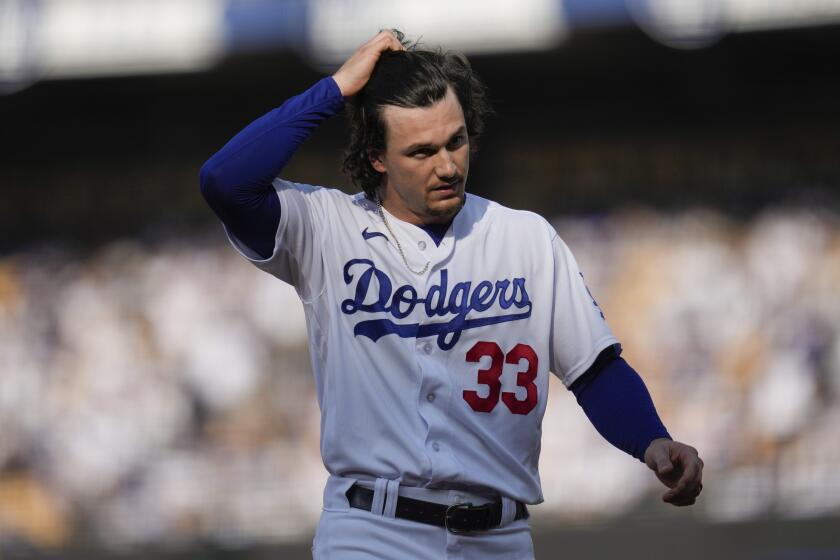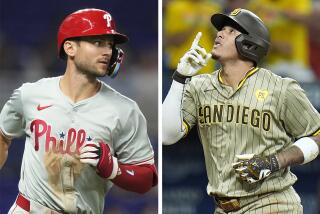Dodgers option slumping rookie Miguel Vargas. So who plays second base now?
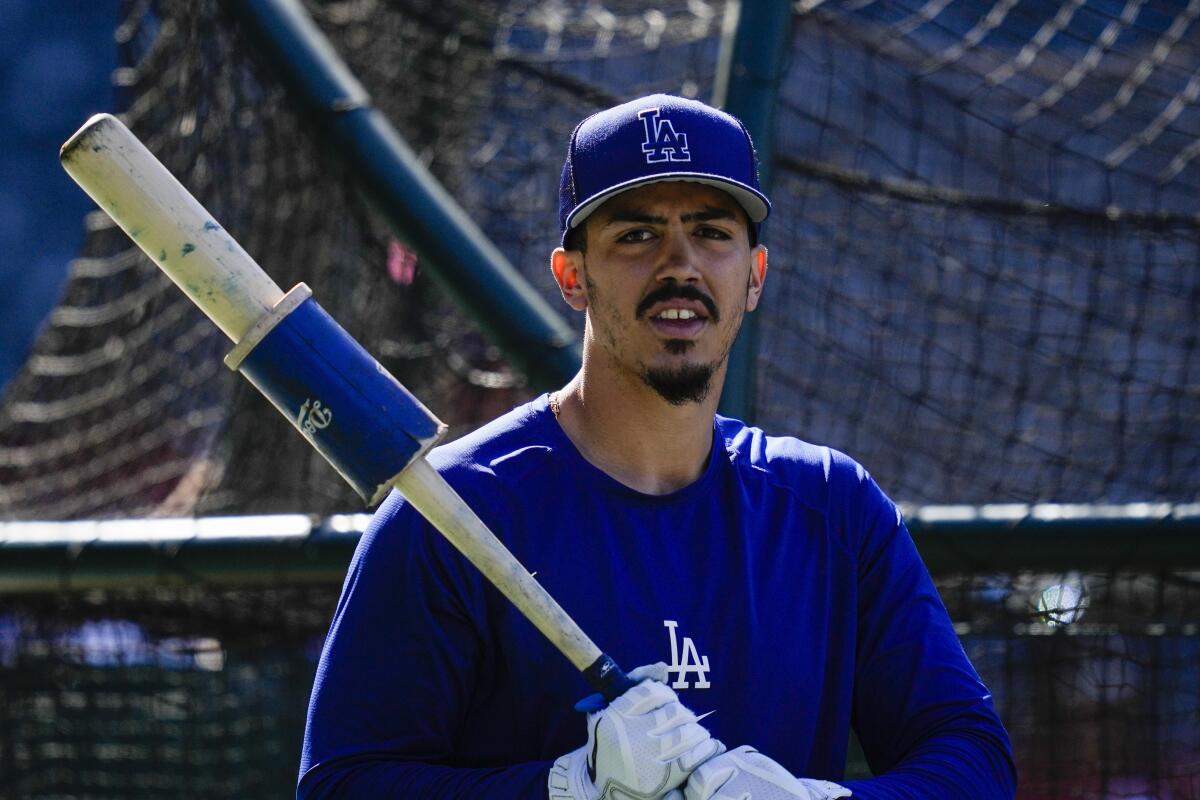
- Share via
What had increasingly felt like an inevitability in recent weeks became reality Sunday.
The Dodgers optioned struggling rookie Miguel Vargas to triple-A Oklahoma City, after he entered the All-Star break batting .195 and in the midst of a five-for-63 slump.
Now, they’ll have to reevaluate exactly who to play at second base in his absence, facing a key roster question less than a month from Major League Baseball’s Aug. 1 trade deadline.
Vargas’ demotion wasn’t much of a surprise.
Despite arriving in the major leagues last year as a highly touted prospect, and making the club’s opening day roster this season as their starting second baseman, the 23-year-old never found his footing as an everyday player.
He batted just .202 through his first 46 games. He rebounded slightly in May, posting a .257 average with 16 extra-base hits during an encouraging 30-game stretch. But recently, he had started to spiral again.
Since June 9, his batting average had dropped almost 40 points. His on-base-plus-slugging percentage tumbled to .672, a well below league-average mark. And leading up to the All-Star break, the Dodgers had begun to slash his playing time, starting him just seven times in the last 13 games.
The Dodgers are inching closer to shipping Miguel Vargas to triple-A Oklahoma City as the second baseman continues to struggle at the plate.
“I do think [he adds to the team],” manager Dave Roberts said last week. “But at what point do you decide that [his struggles] could be detrimental?”
The answer, apparently, is now.
And with Vargas gone, a new list of questions has been created for a Dodgers team that is virtually tied for first place in the National League West.
The two most obvious candidates to take over at second base are Mookie Betts and Chris Taylor.
Betts has already been splitting his time between right field, second base and shortstop all season, noticeably reinvigorated by the opportunity to return to the infield positions he played primarily growing up.
Betts has been a plus defender at second base, posting a plus-three in defensive runs saved over 22 games. He has also supplied his best offensive numbers on days he’s at second, batting .347 with a 1.171 OPS in such games.
In the short term, it’s reasonable to expect Betts to play second when the Dodgers are facing a right-handed pitcher, allowing them to start all three of their left-handed hitting outfielders in Jason Heyward, David Peralta and James Outman (something they had already been doing in recent weeks).
On days they face a lefty starter, Taylor could enter the picture, as he is expected back from a knee injury once the team starts the second half of its schedule Friday (the Dodgers didn’t announce a corresponding move for Vargas on Sunday, but a roster spot is now open for Taylor’s return).
Miguel Vargas was becoming a more proficient defender at a position he made only 27 starts at in five minor league seasons. Then he suddenly forgot how to hit.
Even before getting hurt, Taylor had been battling his inconsistencies at the plate, hitting 11 home runs but batting only .206.
The Dodgers are hoping that, upon his return, he will look more like the former All-Star player who warranted a four-year, $60-million contract two offseasons ago, not the one who has struck out in more than one-third of his plate appearances since then.
As far as organizational depth beyond that, the Dodgers have Michael Busch and Devin Mann in triple A, where both have batted better than .300 with double-digit home runs this season.
They could always bring back Vargas later in the year, too, if he can work through myriad problems plaguing his swing (Vargas had a low strikeout rate of just 20.1%, but ranked among the worst hitters in the majors in average exit velocity and hard hit percentage).
Vargas’ demotion makes something else abundantly clear: The team will be looking for another bat at the trade deadline, probably a right-handed hitter in either the infield or outfield, thanks to Betts’ and Taylor’s defensive versatility.
Roberts indicated such a need last week, even with the team ranking fifth in MLB in OPS against left-handed pitching.
The trade market could present plenty of options, from Tommy Pham and Mark Canha of the New York Mets, to Paul DeJong and Tyler O’Neill of the St. Louis Cardinals, to Lane Thomas and Jeimer Candelario of the Washington Nationals.
The Dodgers also have veteran outfielder Trayce Thompson on the injured list, though his return is unclear and he had been struggling even before suffering an oblique strain last month.
James Outman and Miguel Vargas have had good and bad moments as starters for the Dodgers, who maintain high hopes for both.
All those names are serviceable, but far from spectacular.
And while replacing Vargas offers an opportunity for improvement, the odds of the Dodgers finding a significant upgrade in his absence — either internally or externally — seem slim.
That’s the risk of banking on a rookie hitter to fill an important spot of the lineup, of hoping that Vargas could become the latest low-cost, high-ceiling prospect to bolster their big league roster.
His failure hasn’t wrecked their season. They’ll enter the second half with plenty of ways to replace him.
Still, the best version of this year’s Dodgers team was supposed to include Vargas as an important contributor.
Sunday’s decision cemented the fact that an opposite has played out instead.
More to Read
Go beyond the scoreboard
Get the latest on L.A.'s teams in the daily Sports Report newsletter.
You may occasionally receive promotional content from the Los Angeles Times.

